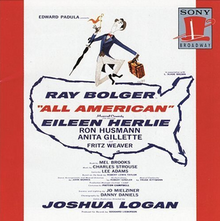
Hello, Dolly! is a 1964 musical with lyrics and music by Jerry Herman and a book by Michael Stewart, based on Thornton Wilder's 1938 farce The Merchant of Yonkers, which Wilder revised and retitled The Matchmaker in 1955. The musical follows the story of Dolly Gallagher Levi, a strong-willed matchmaker, as she travels to Yonkers, New York, to find a match for the miserly "well-known unmarried half-a-millionaire" Horace Vandergelder.

Raymond Wallace Bolger was an American actor, dancer, singer, vaudevillian, and stage performer who started his movie career in the silent-film era.
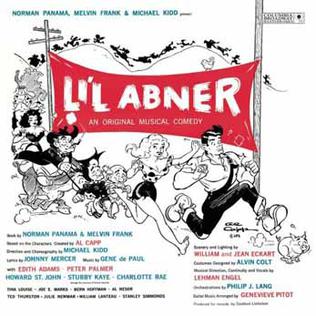
Li'l Abner is a 1956 musical with a book by Norman Panama and Melvin Frank, music by Gene De Paul, and lyrics by Johnny Mercer. Based on the comic strip Li'l Abner by Al Capp, the show is, on the surface, a broad spoof of hillbillies, but it is also a pointed satire on other topics, ranging from American politics and incompetence in the United States federal government to propriety and gender roles.
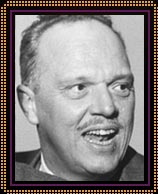
Joshua Lockwood Logan III was an American theatre and film director, playwright and screenwriter, and actor. He shared a Pulitzer Prize for co-writing the musical South Pacific and was involved in writing other musicals.

Bye Bye Birdie is a stage musical with music by Charles Strouse and lyrics by Lee Adams, based upon a book by Michael Stewart.

Charles Strouse is an American composer and lyricist best known for writing the music to such Broadway musicals as Bye Bye Birdie, Applause, and Annie.
Lee Richard Adams is an American lyricist best known for his musical theatre collaboration with Charles Strouse.

New Faces of 1952 is a musical revue with songs and comedy skits. It ran on Broadway for nearly a year in 1952 and was then made into a motion picture in 1954. It helped launch the careers of several young performers including Paul Lynde, Alice Ghostley, Eartha Kitt, Robert Clary, Carol Lawrence, Ronny Graham, performer/writer Mel Brooks, and lyricist Sheldon Harnick.

Good News is a musical with a book by Laurence Schwab and B.G. DeSylva, lyrics by DeSylva and Lew Brown, and music by Ray Henderson. The story is set in the Roaring Twenties at Tait College, where football star Tom Marlowe falls in love with studious Connie Lane, who is tutoring him so he can pass astronomy and be eligible to play in the big game.
"Once Upon a Time" is a song composed by Charles Strouse, with lyrics by Lee Adams, from the 1962 musical All American. It describes the loss of love over time. In the musical, the song was performed by Ray Bolger and Eileen Herlie, and their version appears on the Broadway Cast recording. It has been sung by Eddie Fisher, Bobby Darin, Frank Sinatra, Perry Como, Tony Bennett, Scott Bakula and Bob Dylan among others.
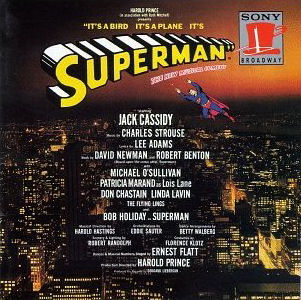
It's a Bird... It's a Plane... It's Superman is a 1966 musical composed by Charles Strouse, with lyrics by Lee Adams and book by David Newman and Robert Benton. It is based on the comic book character Superman created by Jerry Siegel and Joe Shuster and published by DC Comics.

I and Albert is a 1972 musical by composer Charles Strouse, and lyricist Lee Adams. The plot is based on the lives of Queen Victoria and her husband Prince Albert of Saxe-Coburg and Gotha and was adapted for the stage by Jay Presson Allen.
Irwin Kostal was an American musical arranger of films and an orchestrator of Broadway musicals.

Fanny is a musical with a book by S. N. Behrman and Joshua Logan and music and lyrics by Harold Rome. A tale of love, secrets, and passion set in and around the old French port of Marseille, it is based on Marcel Pagnol's trilogy of works titled Marius (1929), Fanny (1931), and César (1936).
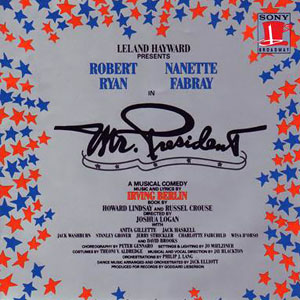
Mr. President is a musical with a book by Howard Lindsay and Russel Crouse and music and lyrics by Irving Berlin. The story focuses on fictional US President Stephen Decatur Henderson, who runs into political trouble following a disastrous trip to the Soviet Union and his problems with his children. Bored with life as a civilian after his presidency ends, he decides to return to political life.
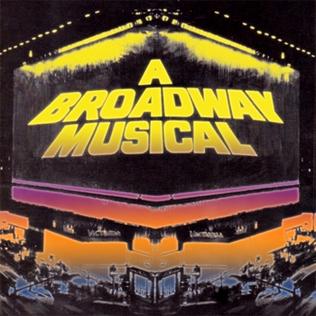
A Broadway Musical is a musical with a book by William F. Brown, lyrics by Lee Adams, and music by Charles Strouse. The Broadway production closed after 14 previews and only one performance on December 21, 1978.

The Band Wagon is a musical revue with book by Walter Thomson and Howard Dietz, lyrics also by Dietz and music by Arthur Schwartz. It first played on Broadway in 1931, running for 260 performances. It introduced the song "Dancing in the Dark" and inspired two films.

Rosalie is a 1937 American musical film directed by W.S. Van Dyke and starring Eleanor Powell, Nelson Eddy and Frank Morgan. An adaptation of the 1928 stage musical of the same name, the film was released in December 1937. The film follows the story of the musical, but replaces most of the Broadway score with new songs by Cole Porter. The story involves the romantic entanglements of a princess in disguise and a West Point cadet.
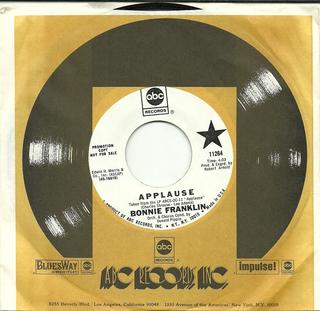
"Applause" is the title song from the 1970 Broadway musical Applause, with music by Charles Strouse and lyrics by Lee Adams, originally performed by Bonnie Franklin, who originated the role of Bonnie in the musical, and recorded as a single with orchestra and chorus conducted by Donald Pippin. The single was released with a B-side featuring the star of the production, Lauren Bacall, making her musical theatre debut, performing "Something Greater" together with Len Cariou. The single's popularity led to Franklin's being invited to perform it on the 24th Tony Awards broadcast on television, where the show gained Best Musical, Bacall Best Leading Actress in a Musical, but Bonnie Franklin missed out on the best supporting actress to Melba Moore.

Parade is a musical revue with book, music, and lyrics by Jerry Herman.
